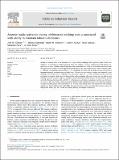| dc.contributor.author | Gilman, Jodi M. | en_US |
| dc.contributor.author | Radoman, Milena | en_US |
| dc.contributor.author | Schuster, Randi M. | en_US |
| dc.contributor.author | Pachas, Gladys | en_US |
| dc.contributor.author | Azzouz, Nour | en_US |
| dc.contributor.author | Fava, Maurizio | en_US |
| dc.contributor.author | Evins, A. Eden | en_US |
| dc.date.accessioned | 2018-03-20T15:58:19Z | |
| dc.date.issued | 2018 | en_US |
| dc.identifier.citation | Gilman, Jodi M., Milena Radoman, Randi M. Schuster, Gladys Pachas, Nour Azzouz, Maurizio Fava, and A. Eden Evins. 2018. “Anterior insula activation during inhibition to smoking cues is associated with ability to maintain tobacco abstinence.” Addictive Behaviors Reports 7 (1): 40-46. doi:10.1016/j.abrep.2018.01.002. http://dx.doi.org/10.1016/j.abrep.2018.01.002. | en |
| dc.identifier.issn | | en |
| dc.identifier.uri | http://nrs.harvard.edu/urn-3:HUL.InstRepos:35014377 | |
| dc.description.abstract | Relapse to smoking after initial abstinence is a major clinical challenge with significant public health consequences. At the brain and behavioral level, those who relapse to tobacco smoking have both greater cue-reactivity and lower inhibitory control than those who remain abstinent. Little is known about neural activation during inhibitory control tasks in the presence of drug-related cues. In the current study, tobacco smokers (SMK; n = 22) and non-smoking controls (CON; n = 19) completed a Go/NoGo task involving smoking cues during a functional magnetic resonance imaging (fMRI) scan. Following the scan session, smokers were required to quit smoking, and maintenance of abstinence was evaluated as part of a 12-week smoking cessation trial. We evaluated pre-cessation brain activity during NoGo trials in smokers who were versus were not able to quit smoking. We then compared fMRI and inhibitory control measures between smokers and non-smokers. We did not find differences between SMK and CON in performance or activation to smoking or neutral cues. However, compared to SMK who relapsed, SMK who attained biochemically-validated abstinence at the end of the smoking cessation trial had greater neural activation in the anterior insula during NoGo trials specifically with smoking-related cues. Results indicate that within SMK, decreased inhibitory control activation during direct exposure to drug-related stimuli may be a marker of difficulty quitting and relapse vulnerability. | en |
| dc.language.iso | en_US | en |
| dc.publisher | Elsevier | en |
| dc.relation.isversionof | doi:10.1016/j.abrep.2018.01.002 | en |
| dc.relation.hasversion | http://www.ncbi.nlm.nih.gov/pmc/articles/PMC5805503/pdf/ | en |
| dash.license | LAA | en_US |
| dc.subject | Smoking cessation | en |
| dc.subject | Tobacco | en |
| dc.subject | fMRI | en |
| dc.subject | Insula | en |
| dc.subject | Cue | en |
| dc.subject | Relapse | en |
| dc.subject | Anterior cingulate cortex | en |
| dc.subject | ACC | en |
| dc.title | Anterior insula activation during inhibition to smoking cues is associated with ability to maintain tobacco abstinence | en |
| dc.type | Journal Article | en_US |
| dc.description.version | Version of Record | en |
| dc.relation.journal | Addictive Behaviors Reports | en |
| dash.depositing.author | Gilman, Jodi M. | en_US |
| dc.date.available | 2018-03-20T15:58:19Z | |
| dc.identifier.doi | 10.1016/j.abrep.2018.01.002 | * |
| dash.contributor.affiliated | Schuster, Randi | |
| dash.contributor.affiliated | Pachas, Gladys | |
| dash.contributor.affiliated | Gilman, Jodi | |
| dash.contributor.affiliated | Fava, Maurizio | |


